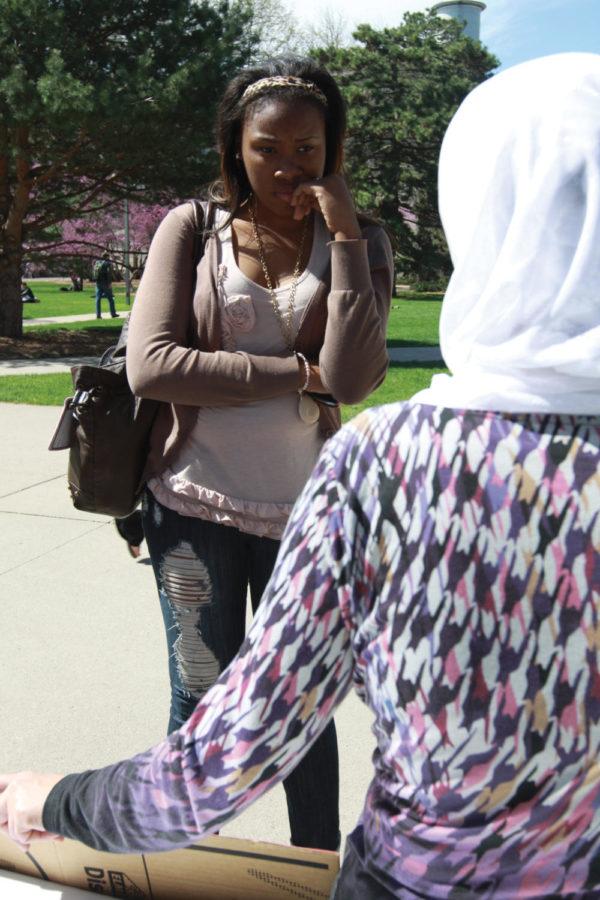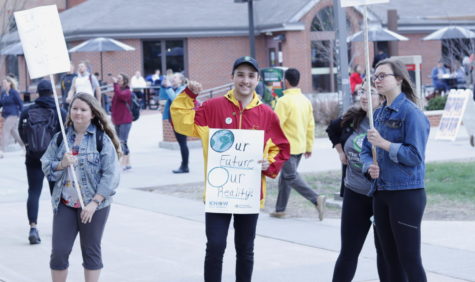ISU students protest for Syria
March 28, 2012
For the people in Syria, being killed simply for saying the wrong words at the wrong time is an everyday occurrence. Constant fear fills their every moment. This has spurred students at Iowa State to stand up and try to make a difference for these people.
“We are trying to raise awareness on campus about these international issues and the corrupted government controlling Syria,” said Ahmad Al-Saygh, senior in community and regional planning and president of the International Student Council. “Not many college students know about these problems, so we are trying to spread the word.”
The council brought with them a speaker who has experienced these problems first hand, but due to the danger still posed to her family, she wishes to remain anonymous. She talked about growing up in Syria, how she could never say what was on her mind for fear of government retribution.
“The people live in a state of constant fear,” she said. “There was a town an hour away from where I grew up that spoke up against the government, the government responded with tanks and mortars, they leveled the entire town along with the 40,000 people who lived there, and my parents couldn’t talk to me about it for fear of bringing that upon themselves.”
These protests started in January of last year, when a worker immolated himself as a part of the Arab Spring movement. Arab Spring is a wave of rebellions that spread across the Arab world beginning December 18, 2010, in Tunisia. The Arab Spring has successfully removed rulers from power in Tunisia, Egypt, Libya and Yemen. These movements have been a response to government repression and human rights violations.
The protests in Syria began as peaceful protests against the harsh treatment from the government, led by President Bashar Al-Assad. The government responded immediately with violence, killing thousands of protesters in the streets.
“[The government] didn’t have the ‘luxury’ of having rubber bullets and water hoses being used on rioters,” she said. “They just shot and killed everyone.”
Syria has been in a state of emergency law since 1963, which gave the government an incredible amount of power over the country in suspending people’s rights. Emergency law placed the prime minister as “martial law governor,” granting his powers to suspend the people’s rights to meet, to travel around the country, the ability to arrest without cause and to delegate any person to the fulfillment of these tasks. The government also set up snipers on the borders to stop refugees from escaping the country.
What the government is doing to repress the people is not acceptable,” said Abhijit Patwa, freshman in mechanical engineering and member of the International Student Council. “And other countries helping Syria’s government is also not acceptable, the people should have autonomy and peace.”
Talks of peace have been suspended in the country. The rioters call for the immediate removal of Al-Assad, who insists he will change his policies, but little has changed in his 10 year reign. The U.N. Security Council has attempted to force talks of peace, but Russia and China have both halted any movement forward towards peace.
Russia is in open support of the current Syrian government, sending arms and soldiers by the boatload to help with quelling the rebellions. The most recent peace attempt involved former U.N. Secretary-General Kofi Annan, who flew to Moscow in an attempt to find strong Russian support towards a ceasefire and open up political discussion on the subject.
Along with giving out this information to students, the International Student Council also had petitions for people to sign for the release of political prisoners. These petitions will be given to the government officials in a symbolic attempt to free the people.
“These are just two of the most recent ones,” said Jiyeon Han, junior in microbiology and the humanitarian committee elect.” They are mostly symbolic, it’s more about spreading the word about Syria and letting people know what’s going on and to draw more attention to it.”

















